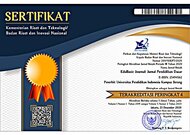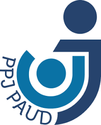Survey of Assessment Techniques for Religious and Moral Values in Early Childhood in Baruga Sub-district, Kendari City
Abstract
Analysis of current assessment practices is crucial to evaluate holistic development of religious and moral values in children from an early age. The purpose of this study was to analyze the implementation of assessment techniques for the development of religious and moral values in early childhood. This study employed a quantitative approach using a survey method conducted in four urban villages in Baruga Sub-district, Kendari City, involving 20 Kindergarten or Raudhatul Athfal teachers recruited through proportional random sampling. The results revealed that 95% of teachers used assessment techniques to evaluate the religious and moral development of children, with direct observation being the most common method. Additionally, 90% of teachers have used rubrics and parental involvement stood at 85%, highlighting the need for improved communication. Moreover, 90% of teachers conducted daily assessments, provided regular feedback, and recorded the results in writing, with daily notes being the predominant documentation method. However, the use of portfolios remained low at 5%. It concludes that early childhood educators are committed to assessing children's religious and moral development through suitable technique, with high parental involvement and frequent assessments demonstrating the importance of continuous monitoring. Nevertheless, the limited use of portfolios suggests that some assessment tools are underutilized, which may limit the comprehensiveness of documentation. It also implies that early childhood educators require continuous professional development to enhance and diversify assessment methods, foster school-parent collaboration, and secure necessary assessments training and resources.
Keywords
Full Text:
PDFReferences
Andayani, S. (2023). Pelatihan pembuatan perangkat perencanaan pembelajaran berbasis penilaian autentik. Sinar Sang Surya: Jurnal Pusat Pengabdian Kepada Masyarakat, 7(1), 35–47.
Anggraini, E. S. (2022). Peningkatan kompetensi keprofesionalan guru PAUD. Jurnal Usia Dini, 8(2), 110–118.
Aprida, S. N., Fauziah, N., & Rosyid, A. (2022). Pengaruh kompetensi guru PAUD dalam meningkatkan daya tarik pembelajaran di era new normal. As-Sibyan: Jurnal Pendidikan Anak Usia Dini, 7(2), 193–204.
Aziz, M. N. A., Yusoff, N. M., & Yaakob, M. F. M. (2020). Challenges in using authentic assessment in 21st century ESL classrooms. International Journal of Evaluation and Research in Education (IJERE), 9(3), 759–768.
Bariyyah, K. (2016). Assessmen perkembangan moral agama pada AUD: Studi di TK ABA Pajangan Berbah Sleman. Al-Athfal: Jurnal Pendidikan Anak, 2(1), 29–42.
Danielowich, R. M., & McCarthy, M. J. (2013). Teacher educators as learners: How supervisors shape their pedagogies by creating and using classroom videos with their student teachers. Action in Teacher Education, 35(3), 147–164.
Defitrika, F., & Mahmudah, F. N. (2021). Development of life skills education as character building. International Journal of Educational Management and Innovation, 2(1), 116–135.
Gunawan, S., & Soesanto, R. H. (2022). Keakuratan umpan balik asesmen terhadap hasil belajar kognitif siswa pada pengerjaan formatif secara daring. Refleksi Edukatika : Jurnal Ilmiah Kependidikan, 13(1), 10–19.
Heikka, J., Hirvonen, R., Kahila, S., Pitkäniemi, H., Yada, T., & Hujala, E. (2022). Links between teachers’ planning, assessment and development time and implementation of curriculum in early childhood education. Early Years, 43(4–5), 1102–1117.
Hidayat, W., Lawahid, N. A., & Mujahidah, M. (2021). Problems and constraints of authentic assessment among children's early education teachers. Asia–Pacific Journal of Research in Early Childhood Education, 15(2), 87–109.
Hjelt, H., Karila, K., & Kupila, P. (2023). Time and temporality in early childhood education and care work. Scandinavian Journal of Educational Research, 68(4), 633–646.
Hornby, G., & Blackwell, I. (2018). Barriers to parental involvement in education: An update. Educational Review, 70(1), 109–119.
Imam, S., & Ikrima, S. (2021). Asesmen perkembangan pada aspek nilai moral dan agama dengan menggunakan teknik penilaian unjuk kerja. Pratama Widya: Jurnal Pendidikan Anak Usia Dini, 6(2), 175–182.
Juwita, T., Suminar, T., & Handayani, S. S. D. (2019). Parental involvement in school program at Bintang Juara Early Childhood Education (ECE). Journal of Primary Education, 9(2), 217–227.
Kale, S., Sugito, S., & Dewanti, S. R. (2023). The influential factors of parents’ involvement in early childhood education: Study of children 4-6 years old. Jurnal PG-PAUD Trunojoyo : Jurnal Pendidikan dan Pembelajaran Anak Usia Dini, 10(1), 1–10.
Mardatillah, O., & Nirwana, E. S. (2024). Assessment on religious values and ethics in the independent curriculum. International Journal of Education, Information Technology, and Others, 7(3), 85–94.
Martin, G., & Atteh, E. (2022). Exploring early childhood education teachers’ assessment practices on learners in Sefwi-Wiawso Municipality of Ghana. Asian Journal of Education and Social Studies, 33(4), 1–14.
Maulida, M. (2019). The implementation of dynamic assesment strategies based on the moral and religious values toward the early childhood: Case study in PAUD Integrated Islam Baitul Makmur in Indonesia. Sunan Kalijaga International Journal on Islamic Educational Research, 3(2), 74–83.
Mondi, C. F., Giovanelli, A., & Reynolds, A. J. (2021). Fostering socio-emotional learning through early childhood intervention. International Journal of Child Care and Education Policy, 15(1), 6.
Mumtazah, D., & Sutama, S. (2021). Program home visit: Penguatan perkembangan nilai agama dan moral anak usia dini di era new normal. Golden Age: Jurnal Ilmiah Tumbuh Kembang Anak Usia Dini, 6(1), 37–46.
Nikawanti, G., Wulandari, H., Muqodas, I., Maranatha, J. R., Adibah, L. M., & Maspupah, N. (2024). Pola asuh orang tua dalam menanamkan nilai-nilai multikultural pada anak usia dini. Murhum : Jurnal Pendidikan Anak Usia Dini, 5(1), 981–989.
Panadero, E., Jonsson, A., Pinedo, L., & Fernández-Castilla, B. (2023). Effects of rubrics on academic performance, self-regulated learning, and self-efficacy: A Meta-analytic review. Educational Psychology Review, 35(4), 113.
Pawlewicz, K., & Senetra, A. (2024). Religious involvement in the context of public moral standards and sustainable social development – A case study of Polish voivodeships. Socio–Economic Planning Sciences, 95, 102016.
Permana, A. I., Nurhafizah, N., & Adibah, K. T. W. (2022). Strategies for developing the religious and moral aspects of early childhood. Al-Athfaal: Jurnal Ilmiah Pendidikan Anak Usia Dini, 5(2), 111–129.
Putra, A. T. A., & Anhusadar, L. (2025). Analisis penggunaan, pemetaan dan rekomendasi teknik penilaian nilai agama dan moral AUD: Studi di TK/RA Kota Kendari. Jurnal Obsesi : Jurnal Pendidikan Anak Usia Dini, 9(1), 435–446.
Schellekens, L. H., Bok, H. G. J., de Jong, L. H., van der Schaaf, M. F., Kremer, W. D. J., & van der Vleuten, C. P. M. (2021). A scoping review on the notions of Assessment as Learning (AaL), Assessment for Learning (AfL), and Assessment of Learning (AoL). Studies in Educational Evaluation, 71(2), 101094.
Smith, T. E., Sheridan, S. M., Kim, E. M., Park, S., & Beretvas, S. N. (2020). The effects of family-school partnership interventions on academic and social-emotional functioning: A meta-analysis exploring what works for whom. Educational Psychology Review, 32(2), 511–544.
Sokhanvar, Z., Salehi, K., & Sokhanvar, F. (2021). Advantages of authentic assessment for improving the learning experience and employability skills of higher education students: A systematic literature review. Studies in Educational Evaluation, 70, 101030.
Steiss, J., Tate, T., Graham, S., Cruz, J., Hebert, M., Wang, J., Moon, Y., Tseng, W., Warschauer, M., & Olson, C. B. (2024). Comparing the quality of human and ChatGPT feedback of students’ writing. Learning and Instruction, 91, 101894.
Suryawati, E., & Osman, K. (2017). Contextual learning: Innovative approach towards the development of students’ scientific attitude and natural science performance. EURASIA Journal of Mathematics, Science and Technology Education, 14(1), 61–76.
Talango, S. R., & Pratiwi, W. (2018). Asesmen perkembangan anak (Studi kasus asesmen perkembangan anak usia 2 tahun). TADBIR: Jurnal Manajemen Pendidikan Islam, 6(2), 49–60.
Tan, C. Y., Lyu, M., & Peng, B. (2020). Academic benefits from parental involvement are stratified by parental socioeconomic status: A meta-analysis. Parenting, 20(4), 241–287.
Wahyuni, S. (2019). Asesmen aspek perkembangan nilai agama dan moral menggunakan teknik penilaian penugasan (unjuk kerja) di TK Al-Fadillah Kelompok (B) usia 5-6 tahun Sleman DIY. Kindergarten: Journal of Islamic Early Childhood Education, 2(2), 80–91.
Waluyandi, F., Trihastuti, R., & Muchtarom, M. (2020). Implementation of parental involvement in learning civic education. Budapest International Research and Critics in Linguistics and Education (BirLE) Journal, 3(4), 1686–1695.
Wuryaningsih, W., & Prasetyo, I. (2022). Hubungan keteladanan orang tua dengan perkembangan nilai moral anak usia dini. Jurnal Obsesi : Jurnal Pendidikan Anak Usia Dini, 6(4), 3180–3192.
Yang, D., Chen, P., Wang, K., Li, Z., Zhang, C., & Huang, R. (2023). Parental involvement and student engagement: A review of the literature. Sustainability, 15(7), 5859.
Yılmaz, A., Aras, S., Ülker, A., & Şahin, F. (2021). Reconceptualising the role of the child portfolio in assessment: How it serves for ‘assessment as learning.’ Contemporary Issues in Early Childhood, 24(4), 411–424.
DOI: https://doi.org/10.17509/ebj.v7i1.81911
Refbacks
- There are currently no refbacks.
Copyright (c) 2025 Universitas Pendidikan Indonesia
This work is licensed under a Creative Commons Attribution 4.0 International License.
This journal is indexed by




.png)




.png)
1.png)


1.png)

.png)